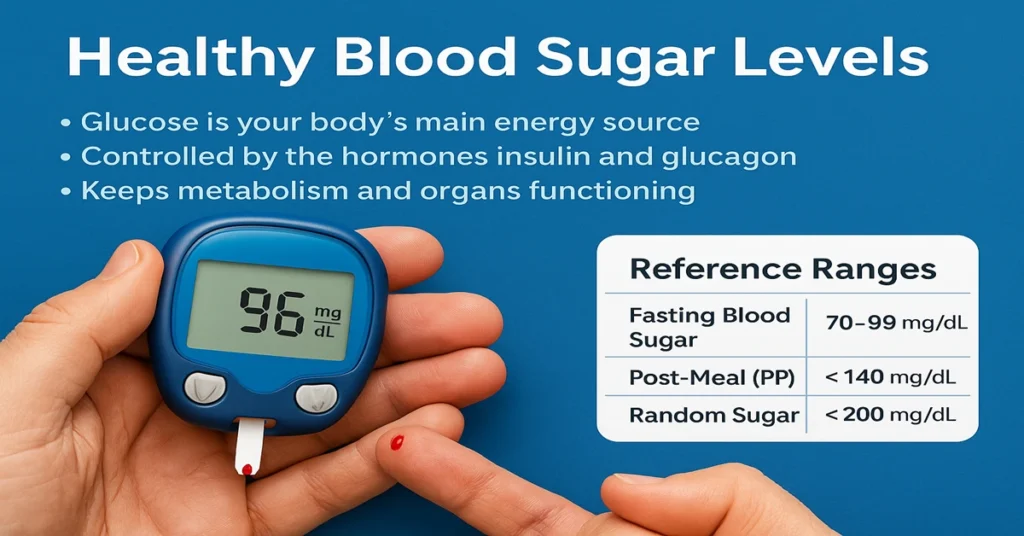What is Blood Sugar?
Blood sugar means the amount of glucose present in your blood. Glucose is the body’s main energy fuel. Every cell, tissue, and organ in your body depends on it to function properly. Without the right level of glucose, your brain, muscles, and vital organs cannot work as they should.
The blood sugar test measures the concentration of glucose in the blood and is one of the most common tests done to check overall health, especially for diabetes and metabolic disorders.
Where is it Synthesized/Produced in the Body?
Glucose is not “made” in the body in its final form — it mainly comes from the food you eat, especially carbohydrates like rice, bread, potatoes, and fruits. However, the body has smart ways to keep sugar levels balanced:
- Liver: The liver plays the central role.
- It can make glucose from non-carbohydrate sources (a process called gluconeogenesis).
- It stores extra glucose in the form of glycogen.
- When the body needs energy, especially between meals or during fasting, the liver releases glucose back into the blood.
This balancing act ensures that your body always has energy available, even when you haven’t eaten for hours.
Main Functions and Importance
Blood sugar is vital for survival. Some of its major functions include:
- Energy supply: Provides instant energy to body cells, especially muscles during activity.
- Brain and nerve function: The brain depends almost entirely on glucose for energy. Low blood sugar can quickly affect mood, focus, and memory.
- Supports exercise and physical activity: Muscles use glucose to power movement.
- Metabolic balance: Maintains balance in how fats and proteins are used in the body.
- Hormone regulation: Works closely with hormones like insulin (to lower blood sugar) and glucagon (to raise blood sugar) for balance.
Causes of Low Blood Sugar (Hypoglycemia)
Hypoglycemia means blood sugar is too low. It can happen for many reasons:
- Hormonal disorders like adrenal gland problems
- Skipping meals or fasting for long periods
- Taking too much insulin or other diabetic medicines
- Excessive alcohol use (especially on an empty stomach)
- Doing intense exercise without eating enough
Symptoms of Low Blood Sugar
When sugar drops below normal, symptoms can develop quickly. These include:
- Shakiness, trembling, or sweating
- Dizziness or feeling confused
- Rapid heartbeat (palpitations)
- Irritability, anxiety, or sudden mood changes
- Blurred or double vision
- In severe cases: fainting, seizures, or unconsciousness
Causes of High Blood Sugar (Hyperglycemia)
Hyperglycemia means too much sugar in the blood. Common causes include:
- Diabetes (Type 1 or Type 2)
- Insulin resistance (cells don’t respond well to insulin)
- Stress or serious infection
- Eating high amounts of sugar or refined carbohydrates
- Lack of physical activity
- Hormonal disorders (like Cushing’s syndrome)
Symptoms of High Blood Sugar
When blood sugar stays high, it may cause:
- Feeling very thirsty and having a dry mouth
- Frequent urination (passing urine often, especially at night)
- Fatigue, weakness, or lack of energy
- Blurred vision
- Headaches
- Slow healing of cuts and wounds
- Unexplained weight loss (especially in Type 1 diabetes)
- If untreated, prolonged high blood sugar can damage the eyes, kidneys, nerves, and heart.
Reference Ranges
(may vary slightly by lab)
| Test Type | Normal Range |
|---|---|
| Fasting Blood Sugar | 70 – 99 mg/dL |
| Post-Meal (2 hours) | Less than 140 mg/dL |
| Random Sugar | Less than 200 mg/dL |
| HbA1c (3-month avg.) | Below 5.7% (non-diabetic) |
Values above these ranges may indicate prediabetes or diabetes and need further testing.
Sample Type
- Sample: Finger prick (capillary) or venous plasma
- Tube Used: Sodium Fluoride (NaF) tube to prevent sugar breakdown in the sample
Test Preparation
- For a fasting blood sugar test, do not eat or drink (except water) for 8–10 hours before the test.
- Avoid alcohol for at least 24 hours before testing.
- If you are on diabetic medicines or insulin, ask your doctor whether you need to adjust the dose before testing.
- For HbA1c, no fasting is required.
When to Consult a Doctor
You should consult a doctor if:
- You have frequent symptoms of high or low blood sugar.
- Your test results are outside the normal range.
- You have unexplained weight loss, constant thirst, or frequent urination.
- You are already diabetic and your sugar levels remain uncontrolled despite treatment.
- You notice delayed wound healing or repeated infections.
Important Word Explanations
- Glucose: The main type of sugar in the blood, used for energy.
- Hypoglycemia: Low blood sugar, usually below 70 mg/dL.
- Hyperglycemia: High blood sugar, usually above 140 mg/dL after meals.
- HbA1c: Test showing the average blood sugar over the past 2–3 months.
- Insulin: Hormone made by the pancreas that lowers blood sugar.
- Gluconeogenesis: Process by which the liver makes glucose from proteins or fats.
~END~

